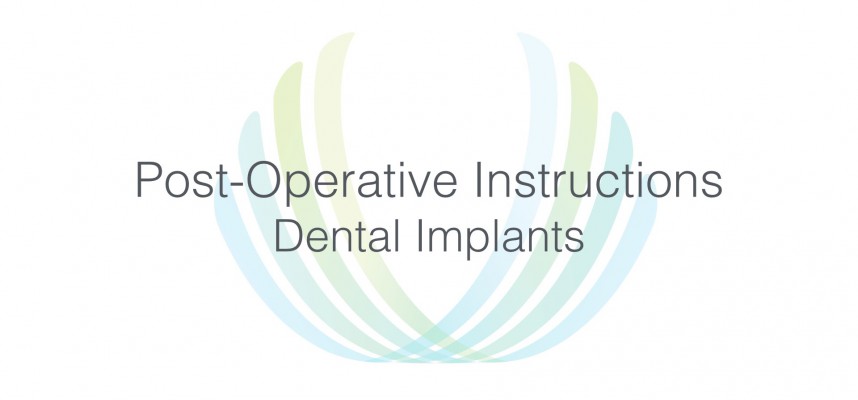It is imperative that you follow the instructions listed below carefully to maximize your healing and improve the long-term outcome of your dental implant(s).
Do NOT disturb the wound. Avoid spitting or touching the wound for a few days after surgery. There may be a metal stump slightly protruding through the gum tissue.
Some bleeding or redness is normal for 24 hours. Excessive bleeding (your mouth fills up rapidly with blood) can be controlled by biting on a gauze pad paced directly on the bleeding wound for 30 minutes. If bleeding continues, please call the office for further instructions.
Swelling is a normal occurrence after surgery. To minimize swelling, apply an ice bag or a plastic bag or towel filled with ice on the cheek in the area of surgery. Apply the ice continuously, as much as possible, for the first 36 hours.
Drink plenty of fluids. Avoid hot liquids or food. Soft food and liquids can be eaten on the day of surgery. You may return to a normal diet 1-2 days after surgery unless otherwise directed.
Warm saltwater rinses can be made by mixing ½ teaspoon of salt in a cup of warm water and should be used at least 4-5 times a day, especially after meals.
Brushing your teeth and the healing abutments is no problem. Be gentle initially with brushing the surgical areas.
Discomfort is normal after the extraction of teeth. You should begin taking pain medication prior to the local anesthetic wearing off. For moderate pain, ibuprofen (also known as Advil or Motrin) may be taken if you are not allergic or intolerant to non-steroidal anti-inflammatory drugs. Ibuprofen (Advil or Motrin) bought over the counter comes in 200 mg tablets: 3 tablets may be taken every six hours as needed for pain (no more than 3200 mg/24 hour period). If you are asthmatic, do not take ibuprofen unless you have tolerated it in the past. If your pain is not controlled by the ibuprofen alone, take your prescribed narcotic in addition. Ibuprofen and your prescribed narcotic can be taken together. For severe pain, the prescribed medication should be taken as directed (please note if this prescription has Tylenol [APAP] in it, do not take any other Tylenol/acetaminophen containing medications). Do not take any of the above medication if you are allergic or have been instructed by your doctor not to take it. This may include patients with liver or kidney disease. Be certain to take your pain medicines with food, this will help prevent nausea.
Remember, narcotic pain medicine will impair your judgment and reflexes.
Keep physical activities to a minimum for several days following surgery. Avoid bending over, heavy lifting, or strain. Keep in mind that you are probably not taking normal nourishment. This may weaken you and further limit your ability to exercise.
